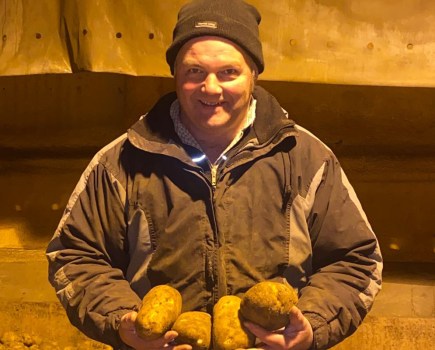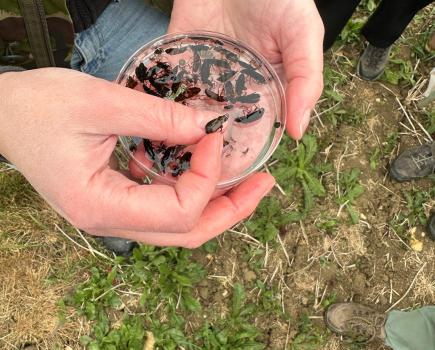By Martin Lines
Does science hold the solutions for farming in the future, or can many of the solutions be found closer to home, under the ground and in the hedges? With large investments from government and private funders going into science and innovation, I’ve started to wonder whether we’re investing enough in futureproof solutions for farming.
During an event a couple of weeks ago, I listened to a group of scientists and plant breeders talking excitedly about the opportunities for and research into GE and GM crops in the future. A farmer in the audience suggested that if farmers focused on improving soil health and farmed in a more regenerative system, many of our current crop health issues would be reduced.
The response from the scientist was quite dismissive to the farmer, arguing it was breeding science that’ll fix the problems with crop diseases and pests, as it’ll give us new adaptable or resistant varieties. This retort had many of the farmers in the room discussing who’s really benefiting from these investments, and who’s really going to benefit from the new genetics and technology that’s currently being invested in.
Will farmers be reducing pesticide and input costs, only to replace them with the costs of expensive new crop varieties, license fees and technology?
New crop varieties boast benefits of ‘improved’ genetics and the resistance to diseases such as barley yellow dwarf virus (BYDV) so you won’t have to spray for aphids in the autumn, and farmers are also eligible to collect the SFI payment for being ‘insecticide free’.
On the surface, this sounds like a win-win situation. However, with the increase in demand for new pest and climate change-resistant varieties, breeders have seen an opportunity and are now adding license fees on top of royalties. Looking at the balance sheet then, an SFI payment for not using an insecticide will already be partially used up on the new license fee, whereas beneficial, predatory insects are free.
An increasing number of farmers haven’t used insecticides for many years, and have only seen very limited damage from aphids in autumn. Improving habitats and forage for beneficial insects and nature on the farm is providing clear financial and crop benefits. Some of the trials we’ve conducted on-farm have shown us that we have far more predators or beneficial insects than pests living in our farmed landscape.
For me, the obvious area of research is: what can nature do for us if we farm more regeneratively? Our understanding of soil health and the soil ecosystem is very limited, but there’s increasing evidence that improving soil health and the biology within has substantial benefits for crop health and resilience, and can reduce the cost of inputs as nature is doing the work for you.
Farmers require greater opportunities to work with scientists on what the research priorities are, and where to invest to provide access to tools and information. Farming in the UK and globally is being practiced with a more regenerative approach. More farmers are making changes in this direction every day in order to futureproof their farms against climate change, increase biodiversity and ultimately to provide themselves with a sustainable, profitable business.
However, much of the current investment and research may be going in other directions on things such as agricultural technology and individual plant problems rather than studying a whole-system approach. Research has to be conducted with farmers, not for farmers, so the science then underpins and assures that ‘my regenerative practices are working, and here’s why’.
Unfortunately, however, if you don’t have a product to sell you can’t make money – nobody makes much money out of trialing new practices and knowledge exchange. Regardless, we have to see increased investment into field science and practices, and move away from lab experiments that answer to another industry’s agenda.
We’re evolving from a farming system of recipes and ingredients to one of knowledge and practices around nature, soil and climate. With the majority of farmers having little spare time to attend knowledge sharing meetings and workshops that’ll be required going forward, who’s going to be coming down our driveways to support us farmers with advice on these new practices?
Talking to organisations such as the AHDB – which is funded by cereal farmers – I’ve discovered they increasingly focus on funding farmer engagement and field trials that farmers themselves have requested. They’re starting to produce interesting and useful information, some of which is available on their website; if you’re not already attending their events or receiving their newsletters I’d recommend doing so.
Keeping the knowledge and control in farmers’ hands is essential for retaining the value of the farming industry. We can’t allow it to be held by others who may not always have farmers’ interests at heart, rather their own commercial gains.
We require a future where funded, scientific research is conducted with farmers, on farms, to investigate nature-friendly regenerative practices, while farmer-to-farmer knowledge exchange and workshops are funded and supported by government and other organisations.
This is a future where farmers are empowered to make the right choices for the future security of their businesses as well as for nature and environmental targets.
This article was taken from the latest issue of CPM. For more articles like this, subscribe here.
Sign up for Crop Production Magazine’s FREE e-newsletter here.




